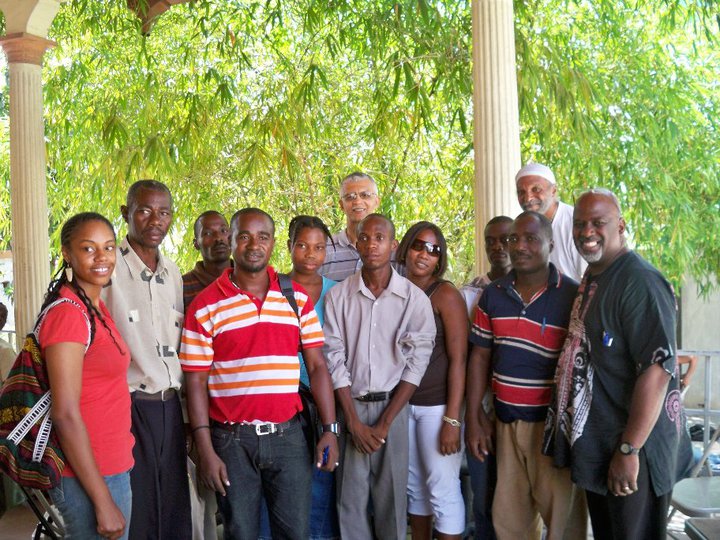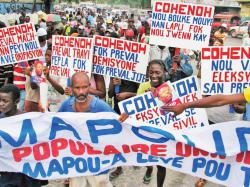The Malcolm X Grass roots Movement (MXGM) is an organization of people of Afrikan descent in the United States who believe in fighting for and supporting self-determination and human rights for Afrikans in the United States and around the world. Our organization annually takes an international trip to build solidarity with other people struggling for liberation and social justice. This year, we come in solidarity to Haiti (with the people of Haiti).
Our objective was to meet with Haitian people and popular organizations and assess the cur rent situation in the camps and through out the country seven months after the earthquake.
What we have found is appalling. There is a lack of security, deteriorating health conditions, and inadequate access to food, water, med i cine and education in the camps. We are particularly concerned about the lack of safety and the large number of reported rapes and violent attacks on Haitian women and children in the camps.
Numerous Haitian people living in the camps have reported that aid groups and Non-Governmental Organization’s (NGO) have provided inadequate aid after millions were collected by the U.S. government (through the Clinton/ Bush initiative), the Red Cross, the United Nations and a multitude of NGOs.
We demand that the US and Haitian governments, and so-called aid organizations, be held account able and immediately collaborate with the popular organizations of Haiti for the distribution of much needed relief to Internally Displaced Haitians.
All the people we encountered in the camps and the popular movement continuously raised concerns not only about the deplorable health conditions and lack of long term planning but also the need for free and fair elections in Haiti that include lifing the ban of Fanmi Lavalas from the upcoming elections, creating a legitimate electoral council and allowing the return of Jean Bertrand Aristide who the people still view as their legitimate leader.
MXGM supports the demands of the Haitian people and popular movement. The current situation is untenable and is a violation of the principles of democracy and human rights.
MXGM opposes the banishment of Dr. Jean Bertrand Aristide from his home land and sup ports the con sis tent popular demand of the Haitian people for his speedy return. We oppose the occupation of Haiti by the United Nations and call for the freedom of Haitian political prisoners. And we sup port the demand for France and the U.S. to pay restitution and reparations to Haiti for slavery and centuries of coercion, and economic exploitation.
We will organize our communities in United States to help end the conditions we witnessed and to build the new Haiti envisioned by the people’s popular movement.
###
Thurs day, August 26, 2010
Con tact: Kamau Franklin
+001 917 53 53 041
www.mxgm.org
kamauf@mxgm.org
Dec la ra tion du Mou ve mente Pop u laire de Mal com X sur les Con di tions en Haiti
Sept Mois Après le Trem ble ment de Terre.
Le Mou ve ment Pop u laire de Mal colm X (MXGM) est une orga ni za tion des peu ples descen dus de l’Afrique aux Etats Unis qui sou tient l’auto-détermination et des droits humains pour des “Afrikans” aux Etats-Unis et mon di ale. Chaque année, notre orga ni za tion voy age à l’etranger pour aug menter la sol i dar ité avec autres com mu nautes qui lut tent pour la lib er a tion et la jus tice sociale. Cette année, nous sommes venues en sol idar ité avec les Haitiens.
Le but de notre séjour ici était a faire la con nais sance des peu ples hai tiens et des orga ni za tions com mu nautaires, et à éval uer la sit u a tion actuelle aux camps et partout sept mois après le trem ble ment de terre.
Ce qu’on a trouvé nous étonne. Aux camps, il y a un manque de secu rité, des con di tions de santé publique dégen eré, et l’acces insuff isant à la nour ri t ure, de l’eau, des medica ments, et d’education. Nous nous occupons en par ti c ulière du manque de secu rité et les nom breux actes de viol et autres formes de vio lence souf fert par des femmes et enfants hai tiens dans les camps.
Plusieurs habi tants des camps nous expliquent que, mal gré des mil lions des dol laires qu’on a ramassé du gou vern ment des Etats-Unis (grace aux fonds de Clin ton et Bush), le Croix Rouge, les Nations-Unies, et nom breux ONGs, l’aide reçu aux camps ne suf fit pas.
Nous insis tons que les gov ern ments des Etats-Unis et d’Haiti, et les organ i sa tions qui s’appellent des “organ i sa tions de l’aide,” soient rédev able et coopérer immé di ate ment avec des organ i sa tions pop u laires en Haiti à coordiner la dis tri b u tion de l’aide essen tielle aux hai tiens déplacés.
Tous les gens qu’on a ren con tré aux camps et dans les organ i sa tions pop u laires nous ont dit qu’il faut améliorer les con di tions affreuses con cer nant la santé publique et aussi le manque de plan i fi ca tion à long terme – mais aussi, on a besoin des elec tions juste en Haiti: l’enlevement de l’interdiction con tre Fanmi Lavalas, la créa tion d’une con seil elec torale légitime, et l’acceuil de Jean Bertrand Aris tide, qui les peu ples tien nent tou jours comme leur chef légitime.
MXGM sou tient les deman des du peu ple hai tien et les mou ve ments pop u laires. La sit u a tion actuelle ne peut pas con tin uer; c’est une vio la tion des principes de la democ ra cie et aussi des droits humains.
MXGM s’oppose du ban nisse ment de Dr. Jean Bertrand Aris tide de son proper pays; nous soutenons le demand con stant des peu ples hai tiens de son retour imme di ate. Nous nous opposons l’occupation d’Haiti par les Nations-Unies; nous deman dons la libéra tion de tous les pris on niers poli tiques d’Haiti. En plus, nous soutenons le demande que France et des Etats-Unis paient la resti tu tion à Haiti pour des siè cles d’escalavage, con trainte, et l’exploitation économique.
Nous déclencherons nos com mu nautés aux États-Unis à aider un nou velle Haiti, comme imag iné par des mou ve ments populaires.
###








